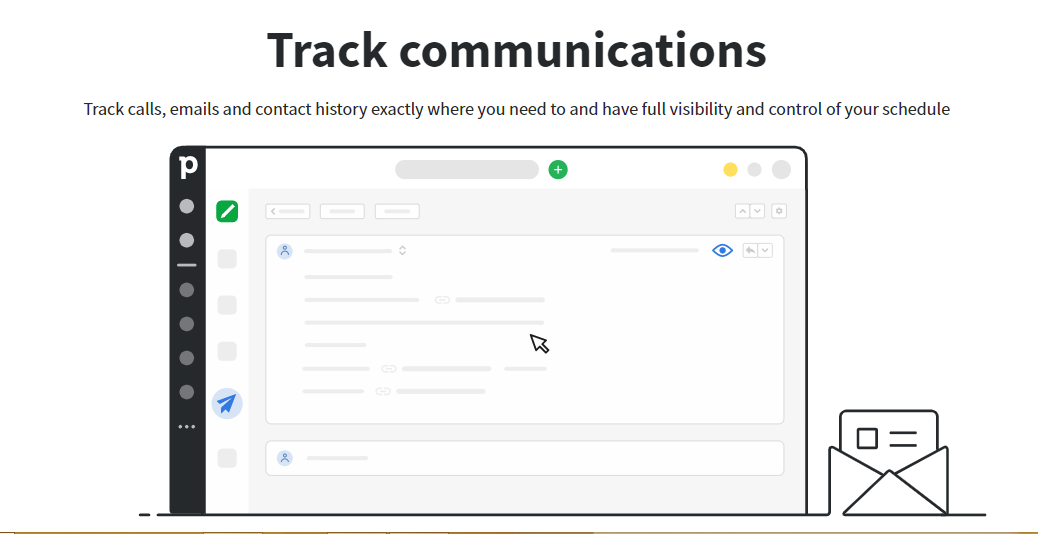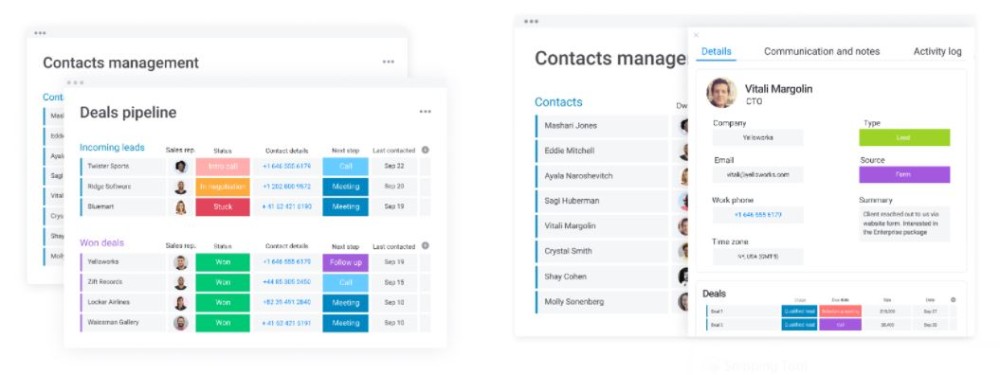Choosing the right software to manage your contacts can be hard. There are literally hundreds of options out there and all of them claim that they are the best contact management software for small business. What should you do?
Think you know everything there is to know about contact management software? There are so many CRM (Customer Relationship Management) software out there and so much marketing jargon that actually confuses the customer. An average customer’s headache upon using simple features such as importing contacts can be excruciating.
Insightly
The great thing about Insightly’s contact management system is how automatic it is. The software tracks potential sales activity on your leads and then automatically routes those leads to the correct member of your sales team so they can strike when the iron is hot.
Insightly can also send bulk emails to customers and notify the sales team whenever contacts open emails, and its account management features keep everything in order.
Insightly offers a highly visual way to view your leads in one place. Source: Insightly software.
The software doesn’t stop there: It links emails and other records to contacts in your database so you can build a picture of an organization’s structure, which both increases your conversion rate and opens the door to more prospecting.
Agile CRM
Agile CRM offers a feature it calls 360 Degree Contact View, which places every bit of information you need about a contact on a single page. This helps your sales team have a more personalized experience with a customer and, therefore, a greater chance of making a sale.
Agile CRM gamifies contact management in a visual dashboard for sales teams.
Source: Agile CRM software.
You can build contact profiles that include important details like communication history, social media profiles, lead scores, and any notes you have on them. You can also share this information across different teams.
Maximizer CRM
Reasons to buy
+Multi-level security+Searchable shared address book+30 day free trial
Maximizer CRM is a business software solution with a robust feature set to cover contact management duties.
Features include a shared address book that can perform searches by a case number or company affiliation and even save them, processes can be automated easily, multi-level security for hierarchical access to control who has access to what data, and integrated with a mobile friendly calendar. Data entry can also be simplified with form field validation that can specify which fields are mandatory, and check for duplicate entries. Advertisement
Maximizer is billed annually and hosted on your own server. A 30-day free trial and a 60-day money back guarantee are also available. There is also a solution whereby the firm hosts the software in the cloud, though this increases the cost per user monthly, billed annually.
Nutshell
Reasons to buy
+Ease of implementation+Free trial+Mobile app support
Reasons to avoid
-No free tier
Nutshell is a customer management solution that can organize contacts and conversations, track leads, automate sales processes, and track it all with easily understandable performance reports. Its easy to use, and the idea is that this is the tool the sales team will actually use.
Towards that end, they offer features such as on-boarding assistance to be up and running in under 24 hours, and accessible support available for no extra charge via phone, email and chat. Nutshell has both iOS and Android apps available to support use on the go.
A 14-day free trial is offered without a credit card. The paid plans begin with the Starter tier which can support a single sales pipeline, standard sales reporting, and offers team collaboration capabilities. There is also the Pro midrange tier, and the top-level plan is Pro Plus which is suitable for more complex needs.
HubSpot
HubSpot is the gold standard for CRM software because it offers a comprehensive feature set that covers sales, marketing, support, and operational activities for free.
It seriously comes with everything you need to streamline contact management processes across your entire business. The robust free tier outshines every other free CRM out there (and even a lot of paid CRMs, too).
We’re not just talking about an extended free trial, here. In fact, you can stay on the free plan for years—maybe even forever—without exhausting all that it has to offer.
You can store contact info for up to one million contacts. HubSpot also includes unlimited user seats so you can onboard your entire team, plus anyone you end up hiring along the way.
And it’s intuitive to use once you get the hang of it. Despite HubSpot’s power and flexibility, you’ll certainly be able to onboard yourself.
It will take more time to get started than other options on our list, but it’s well worth it if you want something that offers plenty of room to grow and advanced features you don’t have to pay for.
One of the biggest reasons we love HubSpot is that you can label contacts as “marketing” or “non-marketing”. Non-marketing contacts—like vendors, freelancers, partners, and customers—are treated differently than those you’re actively marketing to, as they should be.
You don’t have to worry about accidentally sending out a mass marketing email to one of your vendors or a sales contact on the other side of the world.
HubSpot can also automatically pull enriched information about your contacts, including where they work, their position inside the company, and more, so you never have to go digging to get context into who this person is or how you should approach them.
Every plan comes with the option to add on VoIP services so you can make calls, record them, and attach them to contact records inside your account.
Doing so means you can always come back to your calls to remember what happened. You can even use them for training purposes and to ensure your team is always doing a good job when interacting with existing and potential customers.
The free plan comes with 15 free minutes per user per month. But you can buy additional minutes if you need them or integrate with your existing VoIP system instead.
While the workflow builder isn’t available on the free plan, you can still set up simple automations that’ll make your life easier and let you get more work done without sacrificing quality or hiring someone new.
You can also set up dynamic lists (the free plan includes five) that automatically sort and update themselves based on variables you collect about your contacts.
If you run a brick-and-mortar, for example, you could set up a dynamic list that only includes people who live close to your physical location. In doing so, you can speak to those contacts differently than you would someone who lives in another state.
The free plan also lets you set up an autoresponder that instantly delivers an email when someone fills out a form on your site.
While you don’t get the option of creating custom automations, you can still enjoy numerous pre-built automated functions that take a lot of repetitive tasks off your plate.
In terms of connecting other business tools to your contact management software, HubSpot is the clear winner with 252 one-click integrations. Some of the most popular include:
- Gmail
- Outlook
- Facebook Messenger
- Multiple calendars
- Dozens of payment gateways
- SMS tools
- Slack
- Zoom
So, if you want to connect all of your tools and access the most robust feature set without paying a penny, HubSpot’s free CRM is definitely the way to go.
If you need more functionality or ever need to upgrade later on, pricing starts at $68 per user per month. Even if you upgrade, you can still have as many users on the free plan as you’d like, so you don’t have to upgrade everyone across your entire business.
However, the biggest drawbacks are the confusing pricing packages, usage limits that widely vary from one plan to the next, and features that bleed from one hub into another. It’s not straightforward whatsoever.
But it doesn’t affect the free plan, so you don’t need to worry about it now. Just keep it in mind if you decide to upgrade later.
Sign up for the free-forever plan to see if HubSpot is right for you today!
Pipedrive
Track emails, contact history, calls, everything in a single place and have complete visibility of your schedule with Pipedrive. It helps you grow an unlimited database of organizations and contacts and see the entire timeline of your contact history.
Manage the sales conversations from the preferred inbox and automatically receive emails linked to contacts and deals. You can directly make calls from the web for faster call recording, tracking, and insights.

Pipedrive allows you to set up meetings with your invitees by setting a mutual time between both sides. Set your schedules to check and manage activities and save time. Besides, you can send trackable proposals, contracts, and quotes to notify when the document opens.
Furthermore, Pipedrive offers many features, including contacts map, file attachments, customizable signatures, reports and insights, security, integrations, and mobile apps. Choose your deal starting at $12.50/month/user with a FREE trial.
Monday.com
Monday.com allows you to handle all your business contacts in a single place so that you will never miss any leads and be on the top when it comes to sales. Contact cards give full context by showing every contact-related data like tasks, documents, activities, and deals.
Track each activity of your contacts using a timeline and gain visibility into what needs to be done to enhance your business growth. Maintain good customer relationships by providing what they need.

Monitor team performance to gain clarity over the impact of your business through high-level dashboards. Monday.com is a flexible, secure, and scalable work OS that power your business to perform fast.
Integrate with multiple tools you use to make your work even more streamlined, from managing contacts and receiving calls to getting a 360-degree view of every customer. Take the FREE trial of the plan you like according to your business needs.
Conclusion:
Some small businesses try to go it on their own with managing a customer relationship management solution that may include some type of contact management software, such as customer relationship management (CRM) software. They find it can be more cost effective to have business contact management software running in-house than paying a monthly subscription fee and they prefer to have control over the data.